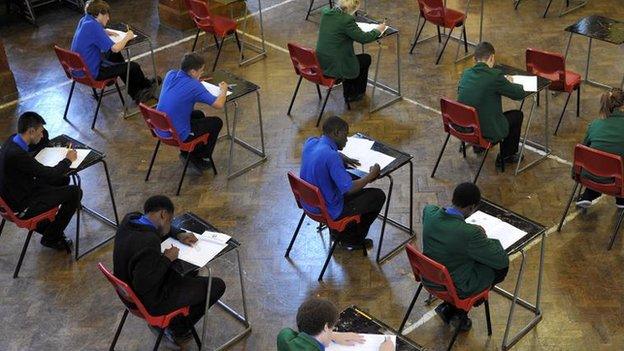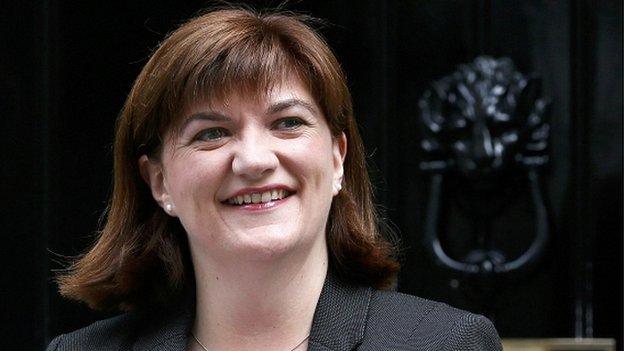'Coasting schools' face tough exam targets
- Published
- comments
Education Secretary Nicky Morgan: ''This is all about helping every pupil to make the progress that they should be making''
Schools in England will face tougher exam targets, under plans announced by Education Secretary Nicky Morgan.
Those falling below the targets, including some rated as "good" by Ofsted, will be labelled as "coasting".
The new threshold for secondary schools will require 60% of pupils to achieve five good GCSEs, including English and maths.
"I'm unapologetic about shining a spotlight on complacency," said Mrs Morgan.
"For too long a group of coasting schools, many in leafy areas with more advantages than schools in disadvantaged communities, have fallen beneath the radar," said the education secretary.
These might be "very good schools but young people are not fulfilling all of their potential".
'Muddled and unfair'
The education department says that "hundreds" of schools will have to raise their results to meet these higher expectations.
But head teachers' leader Brian Lightman said the definitions for this new category were "muddled and unfair".
Schools falling into this coasting category will be given help to improve, but those that fail to make progress could be turned into academies. The classification will be based on three years of results.

Schools will have a new exam target to stay above the "coasting" category
The plans, introduced in the Education and Adoption Bill, are aimed at raising standards in hundreds of schools that are achieving adequate exam results, but where the government believes achievement could be much higher.
There will also be a target for primary schools to stay above this coasting label, requiring 85% of pupils to achieve the expected standard in their national curriculum tests.
As well as those failing to reach these targets, schools will be labelled as "coasting" if a below-average proportion of pupils are making the expected amount of progress.
The plans are aimed at pushing schools to achieve more than the "artificial borderline" of sufficient numbers of good grades at GCSE and in primary tests.
Mrs Morgan says schools should be "stretching every pupil to unlock their potential".
'Credible plan'
Schools falling into the coasting category will be expected to produce a "credible plan to improve" and will be given assistance by "expert" head teachers.
Those that do not improve will be turned into academies.
Coasting schools that are already academies could be given new academy sponsors or extra support, Mrs Morgan said.
These new thresholds for coasting schools are in addition to existing targets for underperformance.
For secondary schools, at least 40% of pupils have to achieve five good GCSEs, including English and maths. At primary level, the threshold is 65% of pupils achieving the expected levels in Sats tests.
In state schools in last year's GCSEs, about 57% of pupils achieved five good GCSEs, including English and maths.
But Mr Lightman, general secretary of the ASCL head teachers' union, said the proposals were "muddled".
He said that the emphasis on exam results would "focus most attention on schools which are in challenging circumstances" rather than being a measure of progress.
'Default option'
Mr Lightman also warned that "academisation is not a magic wand" and that it would not be an answer to problems such as a shortage of maths and science teachers.
Russell Hobby, leader of the National Association of Head Teachers, said that he was reassured that there would be alternatives for school improvement, other than becoming academies.
"Forced conversion into academy status is not going to be the default option for coasting schools," said Mr Hobby.
The NUT's Kevin Courtney said that it would mean that many head teachers in good schools could lose their jobs.
He added: "Nicky Morgan says that coasting schools will ultimately be transformed into academies - but, by her own definition, very many academy schools will also be coasting.
Shadow education secretary Tristram Hunt said: "No parent wants their child to be schooled in an inadequate, failing or coasting school.
"But these plans mean that it is likely that underperforming schools will simply pass from one poor provider to another, without the measures required to turn around sub-standard school leadership and poor classroom teaching."
- Published27 May 2015

- Published27 May 2015

- Published20 May 2015